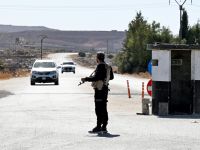U.S. President Bush decided Thursday to send American envoy Anthony Zinni back to the Middle East to try to bring a cease-fire agreement between Israel and the Palestinians.
The president reached the decision surprisingly, based on signals from both sides that after unrelenting bloodshed they were ready to consider a truce, two senior U.S. officials told The Associated Press.
Bush and his top advisers did not predict the outcome. But, said one, insisting on anonymity, "The bottom line is that all those involved concluded that the risks of sending Tony Zinni back were less than the risks of standing aloof."
"All the leaders sent us a signal that this was the right time," a second U.S. official said, also on condition of anonymity.
Israel welcomed Bush's decision. "Prime Minister Sharon values and appreciates the work of General Zinni and the efforts he has made in halting the violence, terror and incitement," Prime Minister Ariel Sharon's office said in a statement.
Also welcoming Bush's move, Palestinian negotiator Saeb Erekat commented Yasser Arafat’s administration hopes Zinni "will bring with him a clear and specific plan" for a cease-fire and a start on peacemaking.
Zinni's mission, inclined to start late next week, may take him to Egypt and Jordan besides talking with Israeli and Palestinian officials. It sends a message that the Bush administration is intensifying its engagement in the Arab-Israeli conflict.
Bush and the administration have been the target of persistent complaints from Arab and European leaders that they were not trying hard enough to reopen peace talks and could not hold back until all fighting had ended.
Colin Powell spoke by telephone Thursday with U.N. Secretary-General Kofi Annan, Foreign Secretary Jack Straw of Britain, Foreign Minister Joschka Fischer of Germany and Javier Solana, the senior European Union diplomat.
Zinni's departure date was not set. Aaron Miller, longtime State Department specialist on the Middle East, will accompany the former Marine Corps general, who failed on two previous mediation trips.
Under the new American initiative, the two sides would start to implement the Tenet cease-fire plan immediately, without waiting for a drop in the violence, with the goal of then moving on to the Mitchell Report's plan for resuming negotiations. Zinni would stay in the region to monitor execution of the PA's commitments under the Tenet plan, which include arresting wanted terrorists and collecting illegal weapons.
U.S. officials, who have long placed the onus on Palestinian President Yasser Arafat to crack down on violence against Israelis, have recently taken a tougher stance toward Sharon.
Vice President Dick Cheney, visiting the region starting Sunday, joined Bush and said that efforts toward peace would be "one of the subjects I'll be discussing with my hosts."
Earlier discussion of Cheney's long-planned trip had denied any connection with peacemaking.
Cheney also has on his agenda a peace initiative being proposed by Saudi Arabia under which the Arabs would offer Israel recognition, peace and trade in exchange for Israeli withdrawal from territory it occupied in the 1967 Six-Day War.
Bush called a plan advanced by Saudi Crown Prince Abdullah "an important opening."
(Albawaba.com)
© 2002 Al Bawaba (www.albawaba.com)







